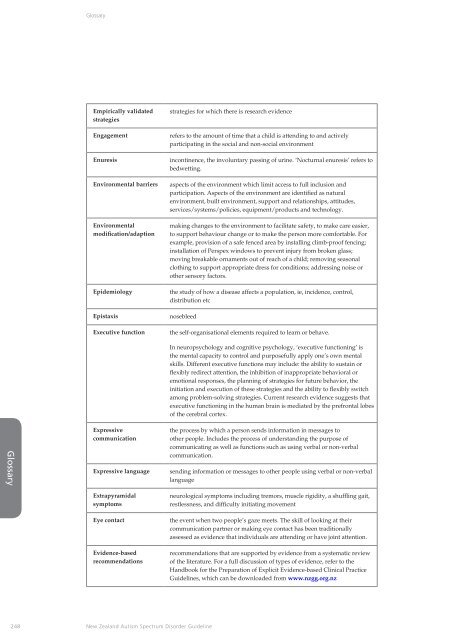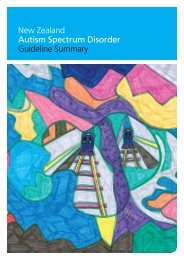New Zealand Autism Spectrum Disorder Guideline - Ministry of Health
New Zealand Autism Spectrum Disorder Guideline - Ministry of Health
New Zealand Autism Spectrum Disorder Guideline - Ministry of Health
Create successful ePaper yourself
Turn your PDF publications into a flip-book with our unique Google optimized e-Paper software.
Glossary<br />
Empirically validated<br />
strategies<br />
Engagement<br />
Enuresis<br />
Environmental barriers<br />
Environmental<br />
modification/adaption<br />
Epidemiology<br />
Epistaxis<br />
Executive function<br />
strategies for which there is research evidence<br />
refers to the amount <strong>of</strong> time that a child is attending to and actively<br />
participating in the social and non-social environment<br />
incontinence, the involuntary passing <strong>of</strong> urine. ‘Nocturnal enuresis’ refers to<br />
bedwetting.<br />
aspects <strong>of</strong> the environment which limit access to full inclusion and<br />
participation. Aspects <strong>of</strong> the environment are identified as natural<br />
environment, built environment, support and relationships, attitudes,<br />
services/systems/policies, equipment/products and technology.<br />
making changes to the environment to facilitate safety, to make care easier,<br />
to support behaviour change or to make the person more comfortable. For<br />
example, provision <strong>of</strong> a safe fenced area by installing climb-pro<strong>of</strong> fencing;<br />
installation <strong>of</strong> Perspex windows to prevent injury from broken glass;<br />
moving breakable ornaments out <strong>of</strong> reach <strong>of</strong> a child; removing seasonal<br />
clothing to support appropriate dress for conditions; addressing noise or<br />
other sensory factors.<br />
the study <strong>of</strong> how a disease affects a population, ie, incidence, control,<br />
distribution etc<br />
nosebleed<br />
the self-organisational elements required to learn or behave.<br />
In neuropsychology and cognitive psychology, ‘executive functioning’ is<br />
the mental capacity to control and purposefully apply one’s own mental<br />
skills. Different executive functions may include: the ability to sustain or<br />
flexibly redirect attention, the inhibition <strong>of</strong> inappropriate behavioral or<br />
emotional responses, the planning <strong>of</strong> strategies for future behavior, the<br />
initiation and execution <strong>of</strong> these strategies and the ability to flexibly switch<br />
among problem-solving strategies. Current research evidence suggests that<br />
executive functioning in the human brain is mediated by the prefrontal lobes<br />
<strong>of</strong> the cerebral cortex.<br />
Glossary<br />
Expressive<br />
communication<br />
Expressive language<br />
the process by which a person sends information in messages to<br />
other people. Includes the process <strong>of</strong> understanding the purpose <strong>of</strong><br />
communicating as well as functions such as using verbal or non-verbal<br />
communication.<br />
sending information or messages to other people using verbal or non-verbal<br />
language<br />
Extrapyramidal<br />
symptoms<br />
Eye contact<br />
Evidence-based<br />
recommendations<br />
neurological symptoms including tremors, muscle rigidity, a shuffling gait,<br />
restlessness, and difficulty initiating movement<br />
the event when two people’s gaze meets. The skill <strong>of</strong> looking at their<br />
communication partner or making eye contact has been traditionally<br />
assessed as evidence that individuals are attending or have joint attention.<br />
recommendations that are supported by evidence from a systematic review<br />
<strong>of</strong> the literature. For a full discussion <strong>of</strong> types <strong>of</strong> evidence, refer to the<br />
Handbook for the Preparation <strong>of</strong> Explicit Evidence-based Clinical Practice<br />
<strong>Guideline</strong>s, which can be downloaded from www.nzgg.org.nz<br />
248<br />
<strong>New</strong> <strong>Zealand</strong> <strong>Autism</strong> <strong>Spectrum</strong> <strong>Disorder</strong> <strong>Guideline</strong>











